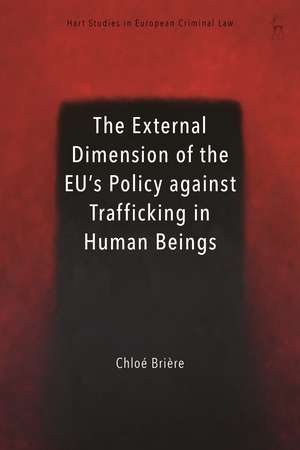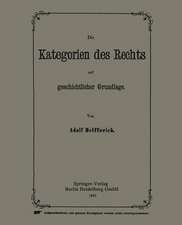The External Dimension of the EU’s Policy against Trafficking in Human Beings: Hart Studies in European Criminal Law
Autor Chloé Brièreen Limba Engleză Hardback – 7 apr 2021
| Toate formatele și edițiile | Preț | Express |
|---|---|---|
| Paperback (1) | 306.94 lei 6-8 săpt. | |
| Bloomsbury Publishing – 19 oct 2022 | 306.94 lei 6-8 săpt. | |
| Hardback (1) | 473.09 lei 3-5 săpt. | +32.92 lei 6-10 zile |
| Bloomsbury Publishing – 7 apr 2021 | 473.09 lei 3-5 săpt. | +32.92 lei 6-10 zile |
Din seria Hart Studies in European Criminal Law
-
 Preț: 147.01 lei
Preț: 147.01 lei - 28%
 Preț: 374.46 lei
Preț: 374.46 lei - 22%
 Preț: 264.45 lei
Preț: 264.45 lei -
 Preț: 306.94 lei
Preț: 306.94 lei - 30%
 Preț: 607.18 lei
Preț: 607.18 lei - 30%
 Preț: 567.99 lei
Preț: 567.99 lei - 18%
 Preț: 322.33 lei
Preț: 322.33 lei - 18%
 Preț: 322.80 lei
Preț: 322.80 lei - 22%
 Preț: 272.23 lei
Preț: 272.23 lei - 22%
 Preț: 270.57 lei
Preț: 270.57 lei - 18%
 Preț: 322.60 lei
Preț: 322.60 lei - 30%
 Preț: 571.66 lei
Preț: 571.66 lei - 27%
 Preț: 409.90 lei
Preț: 409.90 lei - 30%
 Preț: 835.93 lei
Preț: 835.93 lei - 22%
 Preț: 257.97 lei
Preț: 257.97 lei - 18%
 Preț: 306.94 lei
Preț: 306.94 lei - 18%
 Preț: 308.74 lei
Preț: 308.74 lei - 18%
 Preț: 306.47 lei
Preț: 306.47 lei - 18%
 Preț: 323.84 lei
Preț: 323.84 lei - 22%
 Preț: 273.06 lei
Preț: 273.06 lei - 18%
 Preț: 300.98 lei
Preț: 300.98 lei - 18%
 Preț: 299.55 lei
Preț: 299.55 lei - 18%
 Preț: 299.01 lei
Preț: 299.01 lei - 28%
 Preț: 466.81 lei
Preț: 466.81 lei
Preț: 473.09 lei
Nou
Puncte Express: 710
Preț estimativ în valută:
90.54€ • 92.72$ • 75.31£
90.54€ • 92.72$ • 75.31£
Carte disponibilă
Livrare economică 26 februarie-12 martie
Livrare express 11-15 februarie pentru 42.91 lei
Preluare comenzi: 021 569.72.76
Specificații
ISBN-13: 9781509932825
ISBN-10: 1509932828
Pagini: 328
Dimensiuni: 156 x 234 x 27 mm
Greutate: 0.63 kg
Editura: Bloomsbury Publishing
Colecția Hart Publishing
Seria Hart Studies in European Criminal Law
Locul publicării:London, United Kingdom
ISBN-10: 1509932828
Pagini: 328
Dimensiuni: 156 x 234 x 27 mm
Greutate: 0.63 kg
Editura: Bloomsbury Publishing
Colecția Hart Publishing
Seria Hart Studies in European Criminal Law
Locul publicării:London, United Kingdom
Caracteristici
Uses key case studies to assess its effectiveness in combatting the practice
Notă biografică
Chloé Brière is a Post-doctoral Research Fellow funded by the Belgian National Research Fund (FNRS) and a professor of EU law at the Centre for European Law of the Université libre de Bruxelles.
Cuprins
Introduction: Setting the SceneI. Trafficking in Human Beings: A Global Challenge Impacting the EU A. Trafficking in Human Beings as a Global Challenge B. Trafficking in Human Beings as a Challenge for the EU II. Definition of Key Concepts A. Definition of Trafficking in Human Beings B. The EU's Approach to Combating Trafficking in Human Beings C. The External Dimension of the EU's Policy against Trafficking III. How to Analyse the External Dimension of the EU's Policy against Trafficking IV. Structure of the Book 1. Framing the EU's Policy and its External Competences I. Introduction II. The Identification of the Core Components of the EU's Policy A. What is the Acquis? Presentation of a Concept B. What is the Acquis in the Field of the Prevention and Fight against Trafficking in Human Beings? C. Conclusions III. External Competences at the Disposal of the EU A. Specificities of the Union's External Competences Linked to the Area of Freedom, Security and Justice B. The Union's Relevant Express Competences C. The Union's Relevant Implied Competences D. Constitutional Principles Guiding the EU's External Counter-Trafficking Activities E. Conclusions IV. Conclusions on the EU's Policy against Trafficking in Human Beings and its External Competences 2. Unilateral Promotion of the EU's Policy: Case Study of the Western Balkans I. Selection of the Case Study A. The Desire of the EU to Establish Close Cooperation in the Fight against Crime B. The SAP with the Western Balkans as the Selected Case Study II. Promotion of the Fight against Trafficking Via Soft Law III. Promotion of the Fight against Trafficking Via the Conclusion of Agreements A. Association Agreements B. Agreements with EU JHA Agencies C. Agreements Concluded by the EU Member States D. Conclusion IV. The Support of Regional Cooperation A. Regional Initiatives Promoting Police Cooperation B. Regional Initiatives Promoting Judicial Cooperation C. Regional Cooperation Among National Anti-Trafficking Coordinators D. Regional Cooperation as a Preparation for Accession V. Conclusions 3. Multilateral Promotion of the EU's Policy I. Introduction II. The EU's Commitment to Multilateralism III. Institutional Multilateralism: Identification of Relevant Actors A. Traditional Multilateral Actors: International and Regional Intergovernmental Organisations B. Non-Traditional Multilateral Actors: Private Actors C. A Tapestry Incomplete without Mentioning States D. Conclusion IV. Normative Interactions: The EU as a Norm-Taker or a Norm-Setter? A. Interactions Leading to a Common Approach and Objectives B. Consensus About the Objectives to be Pursued C. Interactions Leading to Consistent Standards D. Conclusion V. Multilateralism in Action: Coordination Mechanisms to Avoid Duplication of Efforts A. Internal Coordination Mechanisms in Large Organisations B. Bilateral and Multilateral Mechanisms Among Partners C. Importance of the Coordination and Cooperation Efforts VI. Conclusion 4. Limits of the EU's Actions and Future Avenues for ResearchI. Addressing Trafficking in the Framework of a Renewed EU Migration Policy II. Militarisation of the Response to Trafficking in Human Beings A. The Mobilisation of CFSP Competences B. Trafficking in Armed Conflicts III. Conclusion A. Is the EU's Response Coherent? B. Is the EU's Response Comprehensive? C. The Accountability Gaps






